Amazing Joe Gracey
KOKE-FM program director was the voice of progressive country, and then he lost it
“‘76 in Austin was like ‘69 in San Francisco. It was still there but it showed signs of going down. We’ve just gotten over the stage when we were excited by the mere fact that we had something here. That was fun, like being a teenager with your own car. But you can’t keep up that crazed pace forever. The only thing that’s changed is the ratio of hard work to hot air. - Joe Gracey on the end of the great progressive country scare. AAS 1978.
Joe Gracey had been invited to play golf with Willie Nelson and Ray Benson circa 1980. They ran into Coach Darrell Royal, and as they were chatting, Willie said by introduction, “Do you know Joe Gracey?” Of course he knew Ol’ Blues Eyes, Coach said, using Gracey’s radio nickname. “I just didn’t recognize him without his voice.”
Gracey made his living with his deep, rich baritone since he was a 16-year-old weekend deejay on KXOL in his native Fort Worth. He was a singer, an inventor of radio characters. But at age 27 he was stricken with “permanent laryngitits,” as he called it. Cancer of the tongue and larynx was a cruel twist to a rising radio career that didn’t even take a break during college.
Gracey was an announcer on all-hits KNOW while attending UT. After graduation, he worked at rock station KRMH (“Karma”) as a deejay and program director. He started throwing in some Willie Nelson, who’d just performed at the Armadillo, so why not also mix it up on the radio? The phones lit up, but not in a good way. “What is this shit?” was the consensus. Rockers didn’t like Willie Nelson back then. But Gracey thought they should.
“I was sick of the artificial division between ‘hippies’ and ‘rednecks’ and I detected a serious malaise in rock music,” Gracey told Ed Ward in 1978, before he lost his voice completely. The answer was in some musical crossbreeding. “Texas has always been a musical melting pot, and Austin is its cultural center of energy, so if anything big was going to happen, it had to be here.”
When a 22-year-old Gracey was fired in a regime change at KRMH in the summer of ‘73, he went across the street to KOKE-FM which was in the process of switching from country-western to “progressive country.” Since that sounded a little stiff, station manager Ken Moyer and program director Rusty Bell tagged the format “Super Roper.” Gracey was hired for the 10 a.m. to 2 p.m. slot- hippie drive time. He played almost as many Austin musicians as national acts, because the locals- B.W. Stevenson, Rusty Wier, Michael Murphey, Willie Nelson, Jerry Jeff Walker, Asleep at the Wheel- were getting big across the country.
Austin didn’t invent progressive or “outlaw country” - Sweetheart of the Rodeo came out in 1968. But it was the headquarters for a simple reason: Willie moved here.
Even as a rock fan growing up in Fort Worth and playing bass in the Loose Ends, with T-Bone Burnett and Stephen Bruton, Gracey was a big fan of Willie Nelson. “Willie struck me as someone special even when I was ambivalent about country music in general,” Gracey wrote in Radio Dreams, his memoir. “He was just somehow different. Once I realized he wrote those great classic songs (“Crazy,” “Hello Walls,” etc.) and saw him a couple times at Panther Hall I was a confirmed Willie Nelson fan forever.”
Even after Willie became a multiplatinum artist with “Blue Eyes Crying In the Rain” in 1975, KOKE-FM never got more than an eight share in the Arbitrons. Hippies don’t keep listening journals. If ratings were based on lifestyle influence, from food to fashion to beer to record collections, Super Roper 95.5 would’ve been #1 in the market. “Country music is essentially indigenous to Texas,” Gracey said in ‘78, “and people here were rediscovering their roots.” Longhairs loved to wear cowboy hats.
“What makes us alike is that we’re different,” Willie said about himself, Murphey, Jerry Jeff and the rest. “All of us are being what we were meant to be.”
A country voice for the counterculture, Gracey did all the radio ads for the Armadillo, wrote the rock music column for the Statesman, and was also the talent coordinator that first year of Austin City Limits in 1976. Gracey was proud to reunite Bob Wills’ living Texas Playboys and to book that great Ry Cooder and Flaco Jimenez show, but some of the other ACL acts were not favorites.
Gracey (no one called him Joe) clashed with producer Paul Bosner and was not brought back for the second season. “He would go out and get all pumped up over an act I thought was utterly banal and I’d tell (Bosner) that, so he disliked me more and more as the year went on,” Gracey recalled. The opinionated Gracey went against the fawn patrol in 1974 when he reviewed Bruce Springsteen at the Armadillo. “I can’t help but think he’s highly derivative, highly repetitive, and I would like his music better if it wasn’t for the pretension,” Gracey wrote. “Springsteen rises up out of the ‘60s like the ghost of every high school band on earth and slams those teenage licks down like they’re new and interesting.”
KOKE-FM was born in 1967 when country station KOKE-AM bought KAZZ from Monroe Lopez (one of his four Mexican restaurants, El Charro, was in the future 912 Red River location of the Mohawk). After a block programming rotation of country and Spanish music for a few years, KOKE-FM went straight country. It didn’t officially identify as “progressive country” until August 1973, when the station broadcast live from Castle Creek for three weeks. In 1974, Billboard named KOKE-FM its Trendsetter of the Year.
Just a year after being named program director, Gracey quit KOKE in June 1977 when the station went back to Mandrell country after the cosmic cowboy craze had run its course. A couple months later he was diagnosed with cancer, and eventually his tongue and vocal cords were removed. Unable to speak, he communicated with a Magic Slate children’s toy, and rudimentary sign language.
But life gave him another 34 years, and he made the most of them, falling in love and marrying singer-songwriter Kimmie Rhodes, who became his musical voice, while he wrote songs and played guitar in her backing band, the Jackalope Brothers.
Radio Dreams details the painful and difficult battle with cancer that took Gracey’s life in 2011 at age 61. Written with Rhodes as a “duet memoir” of alternating chapters, the 2017 book also chronicles a life of purpose and music.
Rhodes met Gracey in 1980 when T.J. “Tiny” McFarland took her to the Electric Graceyland studio in the basement of the KOKE building to record some demos. They courted through work and married in 1984.
Gracey was determined to find his way back on the radio through records he produced. Among his credits were albums by Billy Joe Shaver, Calvin Russell, the Skunks and Kimmie’s West Texas Heaven. Gracey was also among the first to record Stevie Ray Vaughan, in Austin and at his mentor Cowboy Jack Clement’s home studio in Nashville. After Stevie got famous he didn’t want those tapes floating around so he asked for them back- and Gracey complied, though he kicked himself later for not making a copy.
Gracey was also a gifted writer on music (“Townes Van Zandt doesn’t demand your attention. He quietly proceeds to deserve it”) and, later in life, food and wine, which he wrote about for Saveur magazine and his “Letter From Graceyland” blog.
Gracey played such a big part in “the music that made Austin famous” that he was honored with a “Thanks, Joe Gracey” benefit at the Armadillo on Thanksgiving 1978. Over $10,000 was raised towards medical expenses, but even greater was the spiritual lift in seeing 1,600 people, the largest attendance ever at the Dillo, come out in support.
Gracey’s career highlights, he wrote, were engineering three albums featuring Willie Nelson, his hero from high school. In 1996, Gracey worked the console on Spirit, Willie’s spare masterpiece that changed the way he made music live. Seven years later, Gracey did the knobs for a pair of Willie duet albums, Run That by Me One More Time, with Ray Price, and Picture in a Frame, with Kimmie Rhodes. That last one was especially gratifying.
Gracey signing off: “Drink lots of water, stay off your feet, and come when you can.” Austin needed folks like Joe Gracey to find itself.
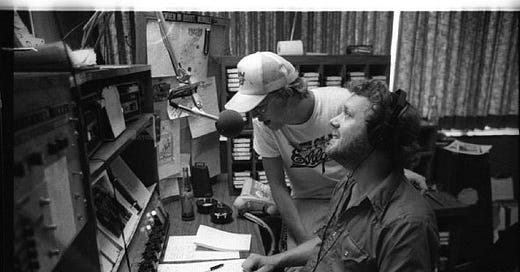


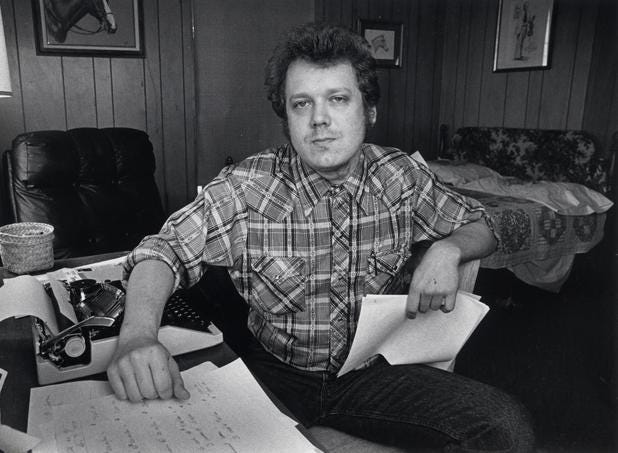
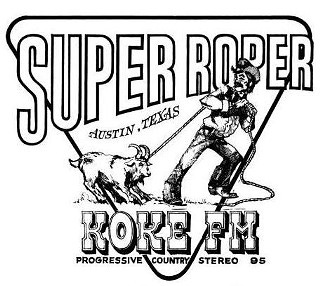
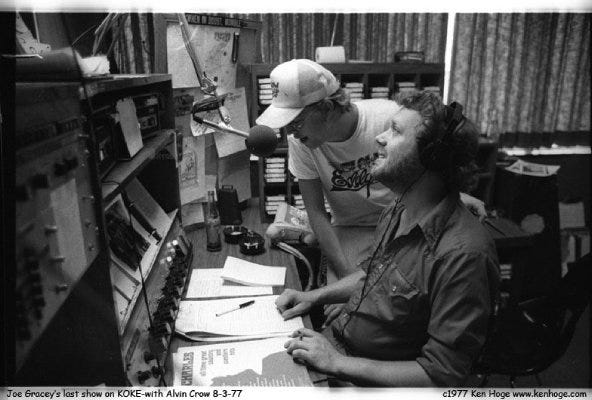
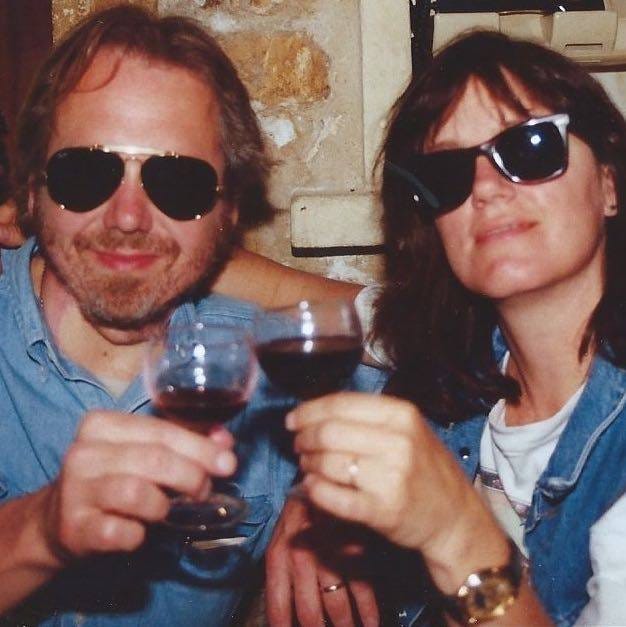
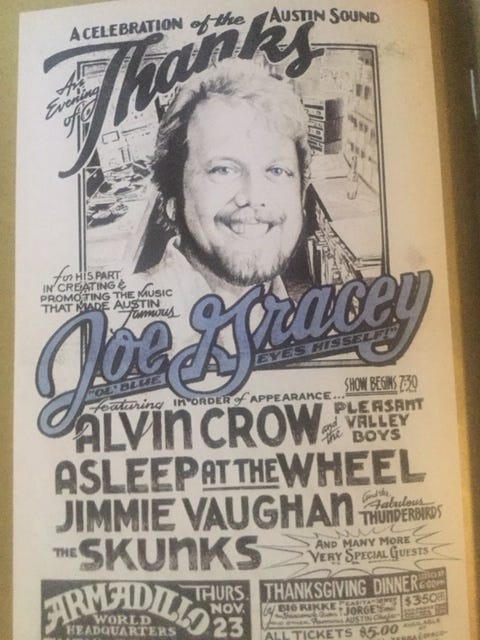
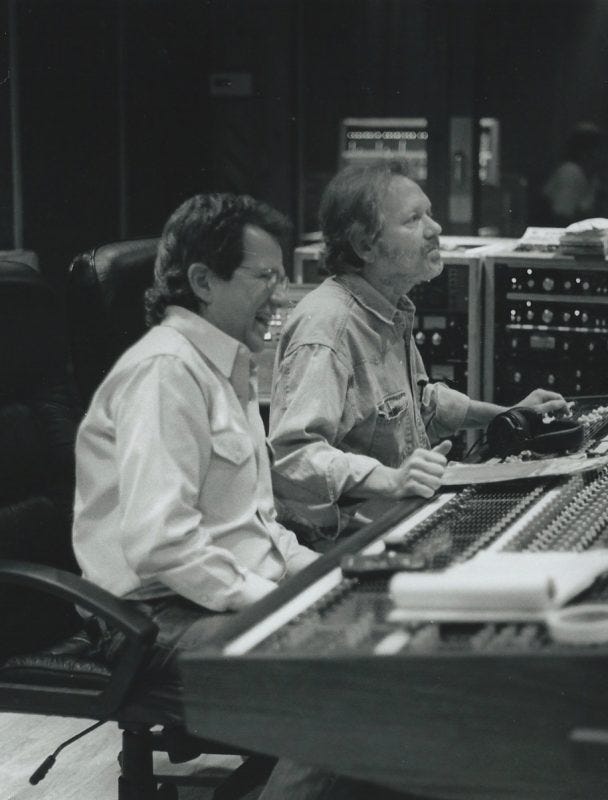
Oh, Gracey. Don't know why I just now stumbled upon this. Nobody like him.
Well crafted piece of writing, Michael. Nicely done